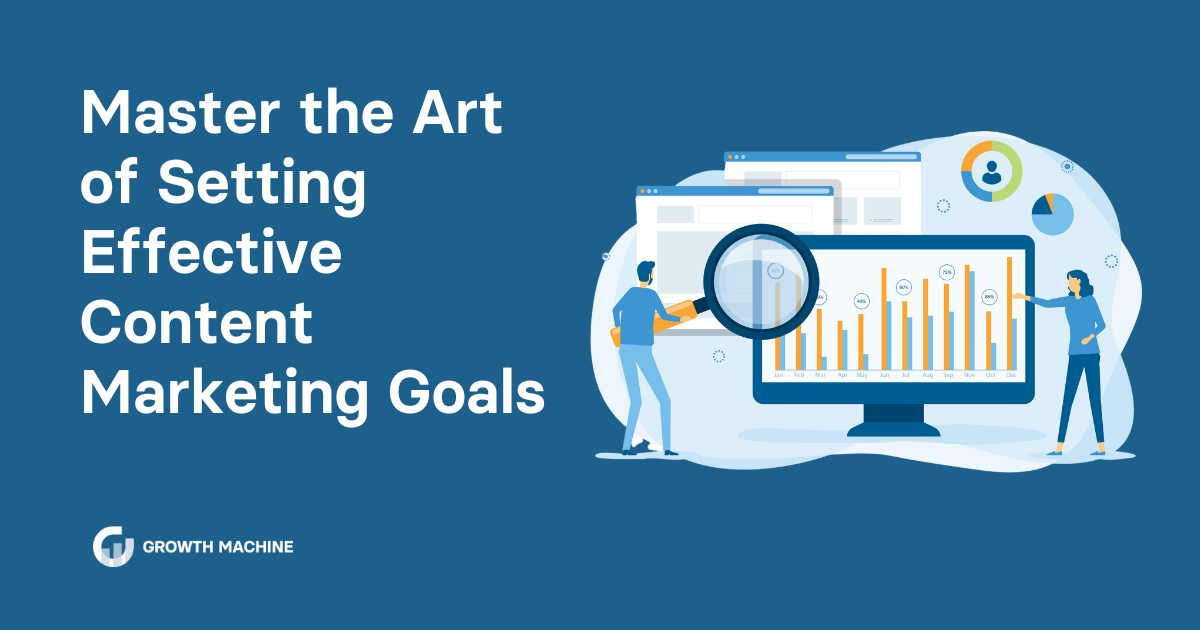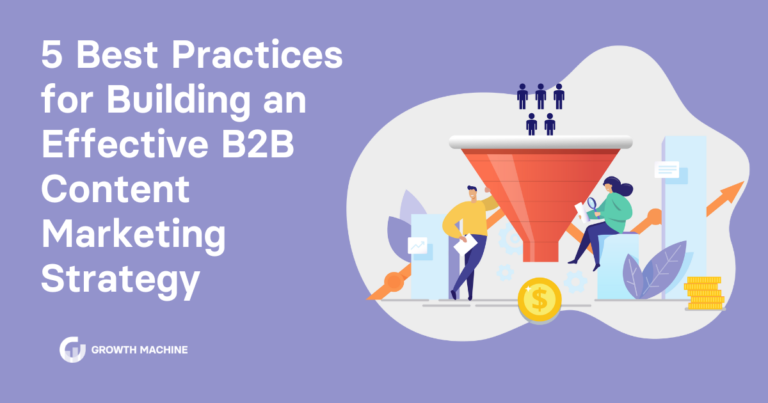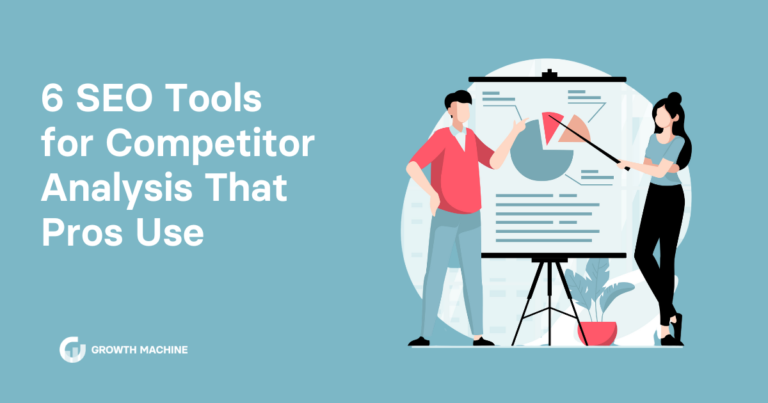Master the Art of Setting Effective Content Marketing Goals
There’s no denying content creation is one of the best ways to get in front of more potential customers. Problem is, without a proper strategy content marketing doesn’t always deliver amazing results.
One of the most common reasons content marketing fails is because businesses lack content marketing goals.
Developing solid content marketing goals gives you a benchmark for checking your progress. This can help you roughly predict how much traffic you should generate from your digital marketing every month, and make sure search engine optimization (or SEO) is on point.
Let’s delve into how to develop content marketing goals that jive with your company’s ambitions for growth and provide actionable insights to improve your search rankings.
What Are Content Marketing Goals and Why Do I Need Them?
Content marketing goals aren’t just something to check off your digital marketing to-do list — they’re your roadmap to business success.
Content marketing goals define what you hope to achieve through your content, guiding your content creation and distribution efforts.
Whether it’s amping up brand awareness, generating new leads, or improving customer engagement, having clear goals ensures that every piece of content fuels your business growth.
How Content Marketing Goals Fuel SEO Success
By creating and distributing valuable content consistently, your business can reach new levels of growth while simultaneously boosting SEO performance. Essentially, the two go hand-in-hand.
By integrating content marketing goals with a long-term plan for SEO growth, businesses can ensure a steady stream of leads, nurturing potential customers through every stage of the buyer’s journey.
Let’s explore how a robust content marketing strategy fuels your SEO engine and supports lasting lead generation efforts.
Content Quality and User Engagement
It’s no secret that high-quality content is the key to SEO success.
Search engines like Google typically prioritize content that offers real value to users — whether that’s answering questions, solving problems, or providing unique insights. By focusing on creating quality content, businesses improve their chances of ranking higher in search results.
Additionally, creating engaging content keeps users on the page longer and signals to search engines that your site is delivering real value, which can further boost your SEO rankings.
Keywords and Search Intent
When it comes to content marketing and SEO, there’s one thing that can’t be overlooked: keywords.
With strategic keyword research, you can drive thousands of organic monthly visitors to your site. But it all starts with a solid content marketing strategy that uncovers the terms and phrases your target audience uses when searching for information online.
By integrating these keywords naturally into your content, your business can boost your visibility in search results for those queries.
However, it’s not just about the keywords themselves but matching the content to the user’s search intent. Clear content marketing goals can ensure that you reach and serve prospective customers to strengthen brand recognition and deepen trust.
Backlinks and Domain Authority
One of the biggest perks of nailing your content marketing goals is the ability to earn backlinks from other reputable websites.
Backlinks are a critical ranking factor for SEO, as they signal to search engines that your content isn’t just good; it’s trustworthy and worth sharing.
The better and more useful your content is, the more likely you are to attract valuable backlinks. These not only boost your site’s credibility (or domain authority), but can also lift your position in search results, helping potential customers find you more easily.
Thought Leadership
Thought leadership content is designed to show off your expertise and provide your audience with unique insights they can’t find anywhere else.
Serving up this type of content consistently positions your brand as a leading authority in your industry, building trust with your audience. When people see you as a knowledgeable and reliable source, they’re more likely to engage with your brand and, ultimately, make a purchase.
It’s not just the trust of your audience that’s important; it’s search engines too. Search engines use various signals to assess how trustworthy a website is. High-quality, insightful content that garners positive user engagement (like longer page visits and lower bounce rates) is one of the best ways to positively influence search rankings.
Types of Content Marketing Goals
At the heart of every successful content marketing strategy lies well-defined goals.
By tailoring your content marketing goals to align with SEO, you not only amplify your impact, but also ensure your efforts are well-aligned with enhancing your visibility on Search Engine Results Pages (SERPs).
Here are some content marketing goals to include in your strategy if you want to climb your way up the SERPS.
Brand Awareness/Website Traffic
Think of brand awareness as your first date with your audience. You want to put your best foot forward, showing what makes your brand unique and why it deserves a place in their hearts (and bookmarks).
To increase brand awareness, lean into content that’s designed to introduce and familiarize your audience with your brand.
Content aimed at boosting brand awareness should be:
- Engaging
- Shareable
- Tailored to your audience’s interests and needs
Expanding your brand’s visibility isn’t just about getting your name out there; it’s crucial for how you appear in search engines and how much traffic you can drive to your site.
Utilize keyword research to identify terms your target audience uses when searching for information related to your industry. For example, our team uses Ahrefs to pinpoint keyword gaps in our clients’ content, then use that data to target new keywords and grow brand awareness.
Crafting content around these keywords, and optimizing for Google’s SERP features like featured snippets and “People also ask” sections, can significantly boost your brand’s presence in search results.
To effectively measure the success of your brand awareness efforts, focus on tracking metrics like website traffic, your rankings for brand-centric keywords. Increased website traffic is a strong indicator that your search visibility is growing, placing your brand front and center when new customers begin their search.
Content Engagement
Engagement is where the relationship with current customers starts to deepen.
Audience engagement is about creating content that resonates and encourages interaction. Nobody likes being talked at, so focus on creating content that sparks a two-way conversation, inviting comments, likes, and shares.
By analyzing search trends, social signals, and engagement metrics, you can use content to meet your audience’s needs. Additionally, optimizing for local SEO can help engage a regional audience, making your content more relevant and accessible to those in your area.
Engaging content also increases the likelihood of backlinks and social media shares, further boosting your SEO efforts.
Metrics to watch include the usual social signals, along with how much quality time visitors are spending with your content.
Lead Generation
If brand awareness is the first date, lead generation is like getting their number. It’s all about crafting content that speaks directly to your audience’s needs and challenges.
Lead generation requires content that targets specific stages of the buyer’s journey, crafted with keywords that match user intent — whether they’re in the awareness, consideration, or decision phase.
Effective lead generation content includes:
- E-books
- Whitepapers
- Webinars
- Templates
Incorporating lead magnets like free e-books or webinars that require an email sign-up to access can be effectively promoted through SEO-optimized landing pages, capturing traffic from search engines and converting visitors into leads.
These pieces of content may require more time and effort to create, but by providing valuable solutions, you position your brand as a trusted authority in your niche.
Plus, you can always outsource your content creation to a content partner that specializes in creating content for SEO.
To determine if your lead generation efforts are paying off, examine how many new leads you’re getting over a specific period of time, how many of those leads are converting to sales, and improved content marketing ROI over time.
Thought Leadership
Effective thought leadership is like being that person everyone wants at their party — the one with insights, stories, and perspectives that make people want to stick around.
Establishing thought leadership involves creating long-form, in-depth content that addresses complex topics, showcases insights, or explores trends within your industry.
Appearing in industry-specific directories, Q&A sites, and forums can enhance your visibility and authority, leading to higher search rankings.
This type of content is also prime for earning quality backlinks, a crucial factor in SEO. By targeting keywords associated with industry expertise or niche subjects, and creating comprehensive content that surpasses competitors’ offerings, you can climb the SERPs faster.
Success here can be seen in the form of increased mentions, SEO backlinks, and invitations to share or contribute as an authority to other websites in your niche.
Build Your Content Playbook
True content magic happens when you’re able to align your content marketing goals with your business’s broader objectives.
Every tweet, blog post, or white paper must not only serve your audience, but also propel your business forward, driving sales and improving customer loyalty.
Follow these steps to craft an effective content strategy — especially when it comes to Search Engine Results Pages (SERPs) and search rankings.
1. Define What Success Looks Like to You
Begin with the end in mind by setting clear, measurable objectives for each of your content marketing goals.
Whether it’s increasing organic traffic by 20%, boosting conversion rates, or achieving a top-five ranking for key search terms, your goals should be SMART: Specific, Measurable, Achievable, Relevant, and Time-bound:
- Specific: Content marketing goals should always be clear and concise. For example, instead of “increase web traffic,” you could have the goal to “increase web traffic by 50% within 6 months.”
- Measurable: Use numbers or metrics to track your progress. For instance, you might aim to generate 300 new leads per month through a free e-book.
- Achievable: Shooting for the moon is great, but remember: Your goals should be realistic and achievable with the content resources your team has at their disposal. This keeps people motivated and ensures success is within reach.
- Relevant: Your content marketing efforts should align with your overall business goals. For example, if your goal is to increase e-commerce sales, one of your content goals could be to increase product page traffic by 25% over the next three months.
- Time-bound: A goal without a deadline is just a dream, right? Setting deadlines drives action and promotes urgency. Break down your timelines by year, quarter, or month — or better, yet, set deadlines for each.
This clarity will not only guide your content creation efforts but also provide a benchmark for measuring your strategy’s effectiveness.
2. Know Your Audience Inside and Out
If you want to set effective content marketing goals, understanding your audience is non-negotiable.
Familiarize yourself with who they are, their pain points, and what problems they’re trying to solve. You can even develop audience personas to get crystal clear on what types of content will resonate with them.
This insight is gold for keyword research, allowing you to tailor your content to the search terms and questions your audience is using.
By aligning your content with your audience’s search intent, you significantly increase your chances of climbing the SERPs, thereby boosting visibility and traffic.
3. Track Progress With Clear KPIs
Key performance indicators (or KPIs) as a must for monitoring how effective your content marketing strategy is.
By defining clear, measurable targets, you can track whether your content is successfully meeting the needs of your target audience.
Always connect content KPIs to your business goals to understand the impact your content is making. This ensures that your content not only attracts new customers, but that you retain them in order to foster long-term business growth.
4. Optimize for Search Intent and Keywords
Content marketing goals focused on optimizing content to match search intent and targeted keywords play a critical role in sustaining lead generation.
By understanding and addressing the queries your target audience is making, you ensure that your content meets their needs at various stages of the buying process.
This strategic alignment with user search intent boosts your content’s visibility in search results, driving organic traffic and generating leads over time.
5. Choose the Right Content Platform
Your content’s home can make or break its success. Whether it’s your blog, YouTube, social media, or industry publications, choose platforms where your target audience actively seeks information.
Consider the search engine ranking potential of each platform. For instance, a well-optimized blog post can rank high on Google, driving consistent, targeted traffic to your site, while an engaging YouTube video can capture attention and clicks through Google’s video search results.
6. Review and Refine Regularly
The digital landscape is always evolving, and so should your content marketing goals.
Use content marketing tools to measure your content’s performance in SERPs, noting shifts in rankings, traffic, and engagement metrics. Identify what works and where there’s room for improvement.
Regularly updating your content to keep it fresh and relevant can also give your SERP rankings a lift, ensuring you stay competitive and visible to your target audience.
Make Your Mark With Amazing Content
Setting better content marketing goals isn’t just about checking the boxes. It’s about ensuring your business grows in a meaningful, measurable way.
By focusing on key areas like brand awareness, lead generation, audience engagement, and thought leadership, and syncing these with your overall business strategy, you’re not just creating content — you’re crafting connections that deepen brand loyalty and lead to long-term customer retention.
Feeling overwhelmed or unsure where to start?
Our team specializes in refining content goals and crafting strategies that not only resonate with your audience but also drive real business results.
Don’t let your content marketing efforts be a shot in the dark. Contact us today, and let’s turn your content into an engine for growth.







